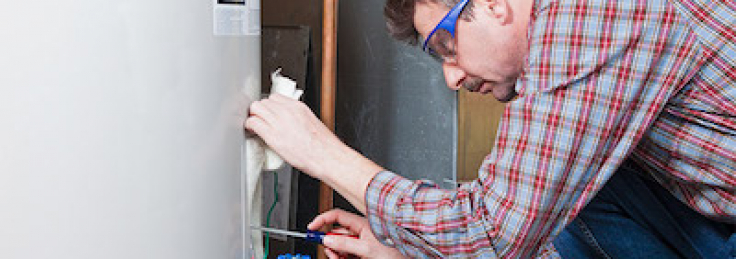Common Heater Issues
Common Heater Issues
Blog Article
This article down below on the subject of Common Problems with Your Home Water Heater is extremely informative. Read it yourself and see what you think about it.

Visualize beginning your day without your regular hot shower. That already establishes an inadequate tone for the rest of your day.
Every home requires a reputable hot water heater, but only a few recognize exactly how to manage one. One very easy method to maintain your hot water heater in top form is to check for mistakes on a regular basis and repair them as soon as they show up.
Remember to shut off your hot water heater before smelling around for faults. These are the hot water heater faults you are probably to run into.
Water too hot or also cool
Every water heater has a thermostat that determines just how hot the water obtains. If the water entering your house is too hot despite establishing a convenient maximum temperature, your thermostat may be damaged.
On the other hand, as well cold water might be because of a failed thermostat, a broken circuit, or inappropriate gas flow. For instance, if you make use of a gas water heater with a busted pilot burner, you would certainly get cold water, even if the thermostat is in perfect problem. For electrical heating units, a blown fuse may be the wrongdoer.
Not nearly enough hot water
Water heaters can be found in lots of sizes, relying on your hot water needs. If you run out of warm water before every person has had a bathroom, your water heater is as well tiny for your family size. You ought to consider setting up a bigger hot water heater storage tank or going with a tankless water heater, which uses up much less space and is a lot more sturdy.
Strange noises
There are at the very least 5 sort of sounds you can hear from a water heater, but the most typical interpretation is that it's time for the water heater to retire.
Firstly, you must recognize with the typical seems a water heater makes. An electric heater may sound different from a gas-powered one.
Popping or banging noises usually indicate there is a piece of debris in your tanks, as well as it's time to cleanse it out. On the other hand, whistling or hissing audios may simply be your valves allowing some pressure off.
Water leaks
Leakages might come from pipelines, water connections, shutoffs, or in the worst-case situation, the tank itself. Gradually, water will rust the tank, as well as find its way out. If this takes place, you need to change your hot water heater as soon as possible.
Nonetheless, before your modification your entire storage tank, make certain that all pipes are in location which each shutoff works perfectly. If you still need assistance recognizing a leakage, call your plumber.
Rust-colored water
Rust-colored water means one of your water heater elements is rusted. Maybe the anode pole, or the storage tank itself. Your plumber will certainly have the ability to determine which it is.
Lukewarm water
Regardless of how high you set the thermostat, you won't obtain any kind of warm water out of a heating unit well past its prime. A hot water heater's performance might minimize with time.
You will certainly likewise get lukewarm water if your pipes have a cross connection. This suggests that when you activate a faucet, warm water from the heating unit moves in along with regular, cold water. A cross link is very easy to area. If your warm water taps still follow closing the hot water heater valves, you have a cross link.
Discoloured Water
Corrosion is a major root cause of filthy or discoloured water. Rust within the water storage tank or a failing anode pole could trigger this discolouration. The anode pole protects the tank from rusting on the inside and also should be inspected yearly. Without a rod or a correctly working anode rod, the warm water rapidly corrodes inside the tank. Call an expert hot water heater technician to identify if changing the anode pole will certainly deal with the problem; if not, replace your water heater.
Conclusion
Ideally, your water heater can last 10 years before you need a change. However, after the 10-year mark, you might experience any one of these mistakes a lot more consistently. Now, you need to include a new water heater to your spending plan.
How To Troubleshoot 3 Common Water Heater Problems in Twin Cities
The Water Heater Is Leaking
A leaky cold water inlet valve A loose pipe fitting A leaky temperature and pressure relief valve A corroded anode rod A cracked tank Turn Off Your Water Heater:
Shut off your gas water heater by turning the gas valve on the unit to the “OFF” position. Shut off your electric water by switching its power off at your electrical panel. Look for a two-pole breaker labeled “water heater” and turn it to the “OFF” position. Move the ball valve connected to the water heater to be perpendicular to the piping at a 90° angle. Look for the Leak:
Depending on whether the water is coming from the tank's top or bottom, you’ll want to look for the leak in different locations.
If the leak comes from the top of the tank, carefully look for water escaping from the cold water inlet valve or loose pipe fittings. Rusted hot and cold water valves can have loose connections with the tank, with water leaking out of them.
https://mspplumbingheatingair.com/blog/how-to-troubleshoot-3-common-water-heater-problems
I stumbled upon that piece about Water Heaters Problems while surfing the internet. Sharing is good. Who knows, you might be doing someone a favor. I appreciate reading our article about Water Heaters Problems.
Connect for clarity. Report this page